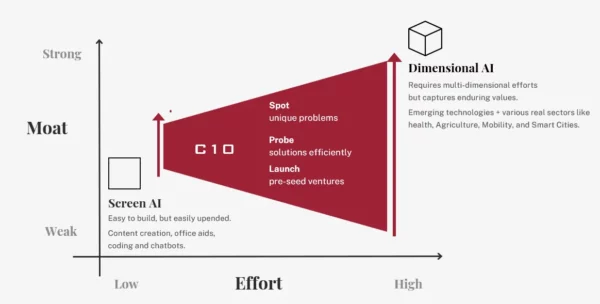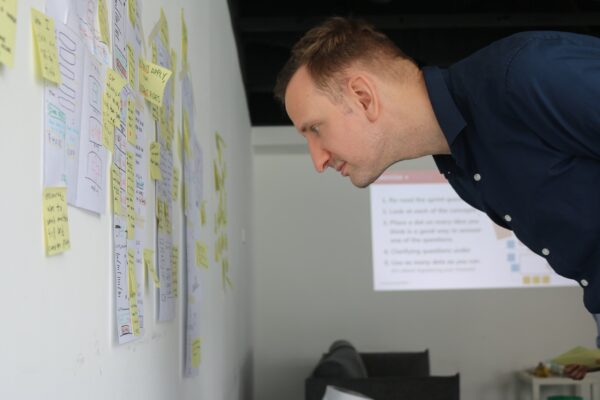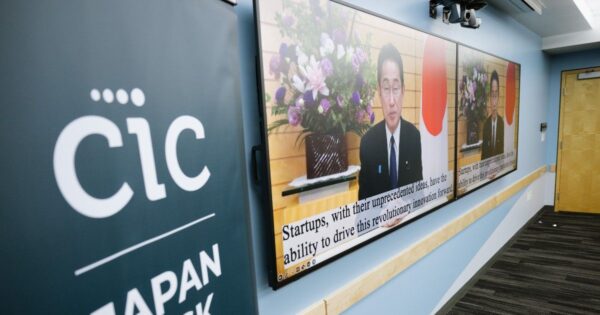By Shannon Smith, CIC Design Team
It is easy to take desks for granted in today’s work environment. They’re just another place to put your laptop, right? We respectfully disagree. A desk is as important to your workplace as a foundation is to your house. It acts as an anchor in a busy, dynamic space—a space in which you may spend more time than you do at home. Whether they sit in a private office, cubicle cluster, or coworking, desks are an essential feature. The real question is—what is the perfect desk?
Recently, many furniture designers have experimented with reinventing the standard workstation. There are brilliant new versions including the trending and health-conscious Standing Desk, the 4,400-square-foot Superdesk, the convertible Also Chair, and custom pieces like the CATable, where one can work alongside their feline coworker. These unique pieces show how creators have identified issues of the office environment and then solved them through resourceful design. Whether one is criticizing unhealthy sitting habits, solidarity, inflexibility, or the unfortunate lack of workplace cats, designers have used redefining desks as a way to subtly improve the way one works.
Though such individualistic desks offer creative and entertaining solutions for a set of unique problems, selecting a uniform piece of furniture that works for dozens of different types of people and environments is an entirely separate game. There are endless questions to answer when designing the perfect desk for all. What are the ideal dimensions? Should there be different sizes for variety or should there be one universal size to optimize efficiency? Should it have drawers? A built-in foot rest? Power would be ideal, but where does that fit in? What about data ports? How heavy is it? Does it stack for storage? Is it adjustable? Can it convert to a standing desk? It has wheels, right? Durability, finish, leg style, shape, material, color, price, availability, and longevity of not only the product but also the company that makes it: these are all important and necessary considerations.
We have asked and answered these questions in our exploration of different desk options. There are three main points that we chose to focus on:
Durability:
A hard, durable surface that is easy to clean and does not scratch easily is crucial. It’s much easier for minor scratches and temporary coffee stains to blend in a textured surface as opposed to a solid color desk. The material of both the top surface and the legs should be as lightweight and resilient as possible. A lightweight steel works well for the legs, adding sturdiness and resistance to scuffing; a medium-weight, milled wood with hard, textured veneer works best for the top.
Efficiency:
Simplicity is key. When selecting a desk that could work for anyone, it is important to note that curves, drawers, holes, or any additional features can actually be more of a hindrance. Making the standard more specific at the start limits the ability of any one individual to customize the desk to their unique needs. Keeping this in mind, the general proportions of a rectangle are ideal in terms of geometric efficiency.
Flexibility:
Flexibility is achieved through subtle features, like height-adjustable legs, and additions, like a desktop riser, cable management, or dividers. A simple, static base combines with a variety of detachable and adjustable components to become a versatile and resilient investment, and modularity means individual parts can be easily upgraded and replaced. Finally, you’re going to want legs with wheels, so that your overall space is as flexible as your desk.
In playing the roles of both simple surface and conceptual construct, and serving as both anchor and pivot point for your office, a desk is a complex piece that must somehow remain straightforward. This balance is even more important when filling a space with multiple iterations of the same piece. The right desk creates a unity between the users, offering everyone the same blank slate on which to draw their future. However inventive or close to perfect it may come, it is ultimately the ideas that one comes up with in their workplace that matters. A desk may only be a desk, but it may also be an adaptable foundation for individual innovation.




